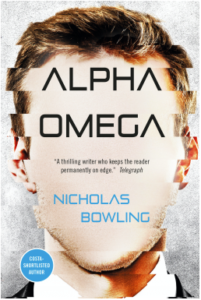At about the 70% mark, I realized that Alpha Omega could slot very easily into the universe of The Matrix, serving as an entirely convincing origin story, so to speak, of that cyberpunk dystopia. The comparisons drawn between this book and Ernest Clines’ Ready Player One are poor: Mr Clines’ novel is a Spielbergian adventure with a young hero triumphant, and AO is very much not that. But it’s deeper and more rewarding in the end, in my opinion, tho there is a fair amount of chaff to get through before then.
 AO is ostensibly the story of Gabriel Backer, a 15 year-old school shooter in the making who was kicked out of the expensive, prestigious Nutristart Skills Academy for irrepressibly hacking their computer systems. Since his expulsion, he’s spent most of his time “In World”, as being online in the vast virtual game world of Alpha Omega is known, to the chagrin of his sight-impaired mother, Stephanie. When he’s approached by someone claiming to be a game dev offering to pay him for playtesting new areas, he’s all in.
AO is ostensibly the story of Gabriel Backer, a 15 year-old school shooter in the making who was kicked out of the expensive, prestigious Nutristart Skills Academy for irrepressibly hacking their computer systems. Since his expulsion, he’s spent most of his time “In World”, as being online in the vast virtual game world of Alpha Omega is known, to the chagrin of his sight-impaired mother, Stephanie. When he’s approached by someone claiming to be a game dev offering to pay him for playtesting new areas, he’s all in.
The majority of the actual story revolves around Tom Rosen, an English and Media teacher at the NSA who’s become increasingly disaffected by the school’s model-corporate-citizen policies. His breaking point comes when one of his students becomes violently ill, is hustled out by school authorities to a waiting car, then promptly falls off the face of the planet. Another student, Alex “Peepsy” Pepys, is convinced that the weird illnesses befalling the NSA students is a result of his stealing the undoubtedly cursed human remains newly excavated by builders looking to erect an impenetrable security wall around the campus. He, Tom and Gabriel become unwitting partners in figuring out what is happening at the NSA and exposing it to the world.
It’s not exactly a spoiler to say that corporate greed is at the bottom of all the shenanigans. It was, however, a shock even to my jaded system to see how Nicholas Bowling so brutally yet elegantly extrapolates from current trends to paint a vision of a corporation-run hellscape dotted with several flavors of misogyny, where people flee to the virtual reality of Alpha Omega for not only entertainment but an almost necessary comfort. It’s a bleak, unsettling portrait of a near-ish future, featuring strokes of mad hilarity and the occasional veering into uncomfortable edgelord territory, that also happens to be an ambitious and ultimately successful send-up of Shakespeare’s Hamlet.
In all honesty, I wish there had been about one third less of the beginning and one third more added to the end of this novel. While AO ends in a liminal state both haunting and wry that hints at a better future, I really do want to know what happens to our characters next, especially brave, resourceful Maggie. This is a subversively smart novel that starts slowly, builds almost neurotically, then ends in a grand explosion that leaves the reader wanting more in the best way possible.
